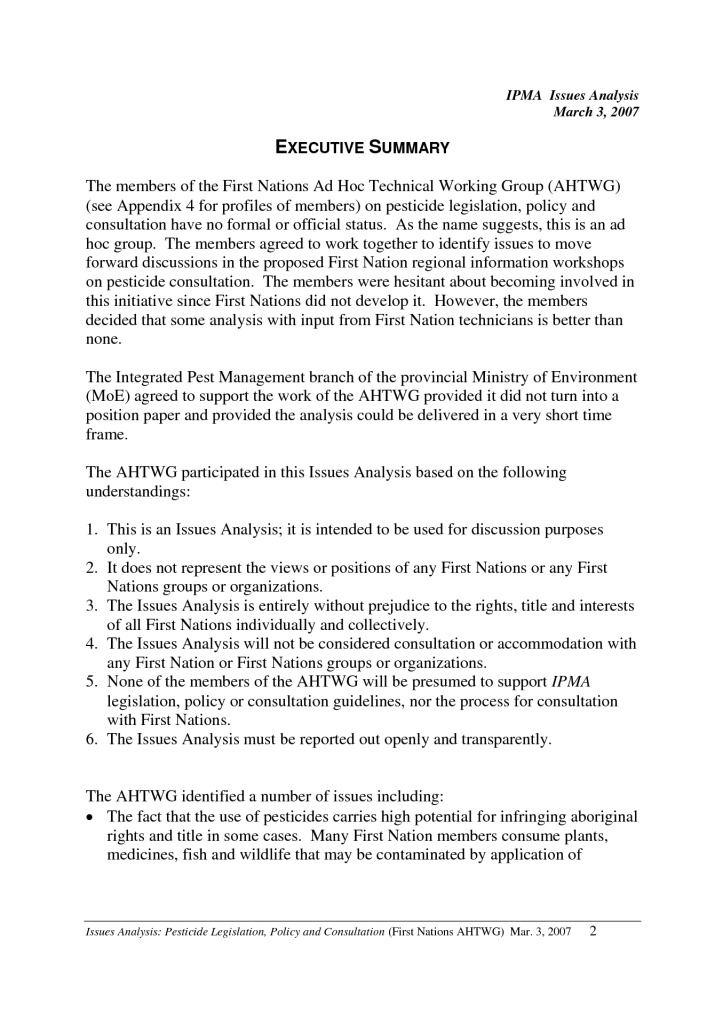EXECUTIVE SUMMARY
The members of the First Nations Ad Hoc Technical Working Group (AHTWG) (see Appendix 4 for profiles of members) on pesticide legislation, policy and consultation have no formal or official status. As the name suggests, this is an ad hoc group. The members agreed to work together to identify issues to move forward discussions in the proposed First Nation regional information workshops on pesticide consultation. The members were hesitant about becoming involved in this initiative since First Nations did not develop it. However, the members decided that some analysis with input from First Nation technicians is better than none.
The Integrated Pest Management branch of the provincial Ministry of Environment (MoE) agreed to support the work of the AHTWG provided it did not turn into a position paper and provided the analysis could be delivered in a very short time frame.
The AHTWG participated in this Issues Analysis based on the following understandings:
- This is an Issues Analysis; it is intended to be used for discussion purposes only.
- It does not represent the views or positions of any First Nations or any First Nations groups or organizations.
- The Issues Analysis is entirely without prejudice to the rights, title and interests of all First Nations individually and collectively.
- The Issues Analysis will not be considered consultation or accommodation with any First Nation or First Nations groups or organizations.
- None of the members of the AHTWG will be presumed to support IPMA legislation, policy or consultation guidelines, nor the process for consultation with First Nations.
- The Issues Analysis must be reported out openly and transparently.
The AHTWG identified a number of issues including:
The fact that the use of pesticides carries high potential for infringing aboriginal
rights and title in some cases. Many First Nation members consume plants, medicines, fish and wildlife that may be contaminated by application of
IPMA Issues Analysis March 3, 2007
Issues Analysis: Pesticide Legislation, Policy and Consultation (First Nations AHTWG) Mar. 3, 2007 2
IPMA Issues Analysis March 3, 2007
pesticides. Consultation should be at the high end of the spectrum where such
risks are present;
- Concerns with sufficiency of consultation with First Nations in developing and passing the IPMA in 2003-2004;
- Lack of recognition of aboriginal rights and title and consultation issues in the IPMA legislation;
- Inconsistency between IPMA and requirements of common law and also the commitments in the New Relationship;
- Issues with the theory of Results-Based Regulation and self-monitoring by companies;
- Issues with removal of judicial review and narrower scope and limitations for appeals to the Environmental Assessment Board, both of which were potentially quicker and cheaper options for First Nations. As well as being less confrontational, more proactive than the alternatives such as court remedies that remain; and
- Issues with the draft consultation guidelines. The AHTWG hopes that these and all other relevant issues raised by First Nations will be fully discussed: – at the upcoming regional information workshops; – in consultations with individual First Nations; and – in discussions with the Leadership Council. The AHTWG further hopes, that plans will be developed with all participating First Nations and First Nation organizations to address all relevant outstanding issues. AHTWG Recommendations Summary #1: Maintain a clear and separate consultation process for the Wildlife Act and for the IPMA in discussions with First Nations. #2: Ensure all First Nations are contacted regarding this process, so they may identify and choose appropriate participants. #3: Develop training for First Nation monitors, evaluators, and auditors.
Issues Analysis: Pesticide Legislation, Policy and Consultation (First Nations AHTWG) Mar. 3, 2007 3
IPMA Issues Analysis March 3, 2007
#4: MoE undertake to identify where and when the WCEL submission were effective in making changes to the IPMA
#5: Through the Regional Information Workshops, if there is First Nation concern expressed related to the Act and its consultation, the AHTWG recommends government consult and review the Act with First Nations.
#6: That technical issues be further identified and a workable plan developed to address the issues raised through the Regional Information Workshops.
#7: At the design workshop one of the recommendations was that there be a continuation of information flow, work from one workshop relayed to the next.
#8: Identify the role for ongoing AHTWG involvement. However ensure the Ad Hoc members are identified in an open and transparent process by First Nations.
#9: MoE to initiate an industry/FN workshop to discuss issues.
#10: For each regional information workshop, it would be useful to have a trend analysis of the pesticide use by the categories used under the Pest Control Act so that exempted pesticides under this Act are not lost in the analysis. This would help indicate whether or there has been a reduction of pesticide use and an increase of Integrated Pesticide Management techniques.
#11: Jointly (FN new AHTWG/MoE) conduct a review of the excluded pesticides with other jurisdictions.
Issues Analysis: Pesticide Legislation, Policy and Consultation (First Nations AHTWG) Mar. 3, 2007 4

